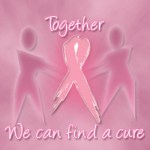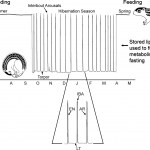stress
Image of lavender fromGFDL 1.2, https://commons.wikimedia.org/w/index.php?curid=322384
While lavender aromatherapy has been documented to reduce stress in humans, little is known about its potential for reducing stress in veterinary medicine. Horses can develop elevated heart rates and stress hormone levels when they are confined to horse trailers and transported to new competition venues. Therapies to reduce stress in competition horses are regulated and often prohibit the use of sedatives or oral supplements. Kylie Heitman, an undergraduate student at Albion College, was interested in…
By Shanghai killer whale (Own work) [CC BY-SA 3.0 (http://creativecommons.org/licenses/by-sa/3.0)], via Wikimedia Commons
I just read an interesting blog from the I Spy Physiology website sponsored by the American Physiological Society which described results from a recent study suggesting that chronic fatigue syndrome (CFS) might be a human equivalent to hibernation.
Chronic fatigue syndrome reportedly affects over 2.5 million people in the United States alone. People with this condition have the type of fatigue that does not seem to improve, even with adequate sleep.
By examining the…
During the holiday season, Kim, Liz and I are taking a short break from blogging. We are posting some of our favorite posts from the past year. Here’s one of them which was originally posted on May 26, 2015:
by Kim Krisberg
After 18 years as a professional house cleaner in the suburbs of Chicago, Magdalena Zylinska says she feels very lucky. Unlike many of her fellow domestic workers, she hasn’t sustained any serious injuries.
Zylinska, 43, cleans residences in the metropolitan Chicago area five days a week. An independent contractor, she cleans two to three houses each day. Fortunately, she…
Back when I started this blog, I hadn't yet become aware of the phenomenon known as quackademic medicine. This phenomenon, as you recall, is the infiltration of academic medical institutions that should be bastions of science- and evidence-based medicine by outright quackery. In quackademic medicine, we see Very Respectable Academic Physicians and Scientists wasting their time studying faith healing like healing touch and reiki, prescientific medicine based on primitive vitalism such as traditional Chinese medicine and (of course) acupuncture, and even sympathetic magic like homeopathy. It's…
After 18 years as a professional house cleaner in the suburbs of Chicago, Magdalena Zylinska says she feels very lucky. Unlike many of her fellow domestic workers, she hasn’t sustained any serious injuries.
Zylinska, 43, cleans residences in the metropolitan Chicago area five days a week. An independent contractor, she cleans two to three houses each day. Fortunately, she doesn’t do the job alone — she always works with at least one other person, so they can help each other with much of the lifting and other types of repetitive physical labor that can often lead to preventable injuries and…
Do food assistance programs deliver more than food and nutrition? Can relieving the stress of food insecurity provide positive psychological benefits as well? A new study says yes it can.
In a study published in the June issue of the American Journal of Public Health, researchers set out to examine whether participating in the Supplemental Nutrition Assistance Program (SNAP), formerly referred to as food stamps, was associated with better overall well-being and specifically, lower rates of psychological distress. In analyzing data from the SNAP Food Security survey, the largest longitudinal…
For all you city-dwellers out there, next time you walk by a vacant lot that’s been refurbished with green gardens and budding trees, take note of your heart rate. You might find the pleasantly green view caused a welcome moment of relaxation and lowered stress.
At least that’s what researchers found in a new study published this week in the American Journal of Public Health. In monitoring the ambulatory heart of rate of study participants in Philadelphia before and after they walked by vacant urban lots that had received a “greening remediation treatment,” researchers found that seeing a…
Congratulations to Mallory Ballinger, a graduate student from the University of Minnesota-Duluth, who is the 2015 recipient of the Dr. Dolittle Travel Award! The purpose of this award is to recognize an outstanding graduate student or postdoctoral fellow involved in comparative and evolutionary research and to provide assistance for them to attend the annual American Physiological Society Experimental Biology meeting. The application process includes the submission of a blog entry based on their research. She will be presenting her research at the upcoming Experimental Biology meeting in…
Gayle DeLong has been diagnosed with what she refers to as “autism-induced” breast cancer.” She’s even given it an abbreviation, AIBC. Unfortunately, as you might be able to tell by the name she’s given her breast cancer, she is also showing signs of falling into the same errors in thinking with respect to her breast cancer as she clearly has with respect to autism. As a breast cancer surgeon, regardless of my personal opinion of DeLong’s anti-vaccine beliefs, I can only hope that she comes to her senses and undergoes science-based treatment, but I fear she will not, as you will see. Her…
A recent study published in the American Journal of Physiology - Regulatory, Integrative and Comparative Physiology presents evidence that altering the sex of just the fat body in heads of fruit flies (Drosophila) causes them to have stress responses similar to the opposite sex.
Males and females vary in their response to stress. It turns out that this difference is not unique to mammals as male and female fruit flies also show similar variations. In fruit flies this is thought to be due to differences in the neuronal circuits between the sexes, which may also explain some of the variability…
Image from the American Physiological Society's website.http://www.the-aps.org/mm/Conferences/APS-Conferences/2014-Conferences/…
Wednesday was the last day of the meeting that culminated in a closing banquet with an awards session to honor students who had exceptional presentations. What an impressive group of young comparative physiologists! The plenary lecture was given by Dr. Steven Chown (Monash Univ, Australia). He spoke about climate change forecasts and continuing environmental changes and how important it is to understand how animals adapt to changing conditions in order to make…
Shivering is one mechanism by which heat is produced in the body. Heat production is called thermogenesis. Another mechanism is through nonshivering thermogenesis regulated by brown fat (i.e. adipose). This second type of heating mechanism kicks in when we need extra heat production such as a postnatal infant, someone developing a fever, an animal arousing from hibernation, eating, or in the case of the current study, stress.
A recent study published in the American Journal of Physiology provides evidence that during stressful events brown adipose tissue can elevate body temperature through…
Perovskite solar cells can not only emit light, they can also emit up to 70% of absorbed sunlight as lasers.
Critical signaling molecules can be used to convert stem cells to neural progenitor cells, increasing the yield of healthy motor neurons and decreasing the time required to grow them.
Mexican blind cavefish are so close to their sighted kin that they are considered the same species, but they use pressure waves (from opening and closing their mouths) to navigate in the dark.
Electrostatic assembly allows luminescent elements (like Europium) to be embedded in nanodiamonds; these glowing…
Helping others isn't only the right thing to do, it's the healthy thing to do.
In a recent study published in the September issue of the American Journal of Public Health (AJPH), researchers found that helping others was a predictor of reduced mortality because it buffers the relationship between stress and death. In other words, stress did not predict mortality among people who had helped others in the past year, but it did predict mortality among those who had not helped others.
In fact, study researchers found that their data, along with previous data, "indicate that help given to others…
Feel the need to eat chocolate when under pressure? You might be able to blame it on your genes, specifically a gene in the brain that responds to stress. This gene, when active, brings out your anxiety and as well as bringing about metabolic changes that tell your body to burn sugar, rather than fat. The same metabolic changes reduce insulin sensitivity in muscles, raising sugar levels in the blood, and causing the pancreas to churn out more insulin. According to the Institute scientists who revealed the gene's function, if the constant stress of daily life keeps this gene overworked, the…
Interesting post today at juggle.com, showing the evolution of a conspiracy theory akin to a game of telephone. Interestingly, it starts with an article in Wired by author (and former Scienceblogger) Johah Lehrer. Lehrer wrote an article on the effects of chronic stress on health outcomes, and one researcher's work to develop something akin to a vaccine to mitigate the stress effects. Sounds reasonable, no?
Next, the Daily Mail picked up the article, and focused on the "stress vaccine" angle.
Finally, the folks at Alex Jones' Prison Planet--who've never met a conspiracy theory they didn't…
Three-dimensional models of hominoid skulls used in the study - (a) Hylobates lar; (b) Pongo pygmaeus; (c) Pan troglodytes; (d) Gorilla gorilla; (e) Australopithecus africanus; (f ) Paranthropus boisei; (g) Homo sapiens. They have been scaled to the same surface area, and the colors denote areas of stress (blue = minimal stress, pink = high stress). From Wroe et al, 2010.It is all too easy to think of human evolution in linear terms. From our 21st century vantage point we can look back through Deep Time for the first glimmerings of the traits we see in ourselves, and despite what we have come…
A nice short piece on "The Prehistory of Stress" by Matt Ford at Ars Technica (newly designed site worth checking out).
I have heard people say, on multiple occasions, that they think stress is a modern, Western phenomenon. While the psychological phenomenon known as stress has only had a formal name for just over 80 years, knowing when it was first suffered by our ancestors is a daunting task. Was life really better in the past? Is stress an entirely modern phenomenon?
Using modern forensic technology and a decidedly modern understanding of biochemistry, researchers from The University of…
More or less alongside my piece on depression's wiring diagram, this months' Scientific American Mind has a piece I wrote on how social hierarchies develop among rats.
Darlene Francis, a psychologist at the University of California, Berkeley, placed 80 newly weaned rats in cages of four, with cage mates matched for size, activity level and early life environment. To Francis's amazement, it took weeks--until the rats were well past puberty--for a social hierarchy to evolve (as indicated by which mouse got first dibs at food and water, among other measures). Perhaps more surprising was that…
The trauma of child abuse can last a lifetime, leading to a higher risk of anxiety, depression and suicide further down the line. This link seems obvious, but a group of Canadian scientists have found that it has a genetic basis.
By studying the brains of suicide victims, Patrick McGowan from the Douglas Mental Health University Institute, found that child abuse modifies a gene called NR3C1 that affects a person's ability to deal with stress. The changes it wrought were "epigenetic", meaning that the gene's DNA sequence wasn't altered but it's structure was modified to make it less active.…







